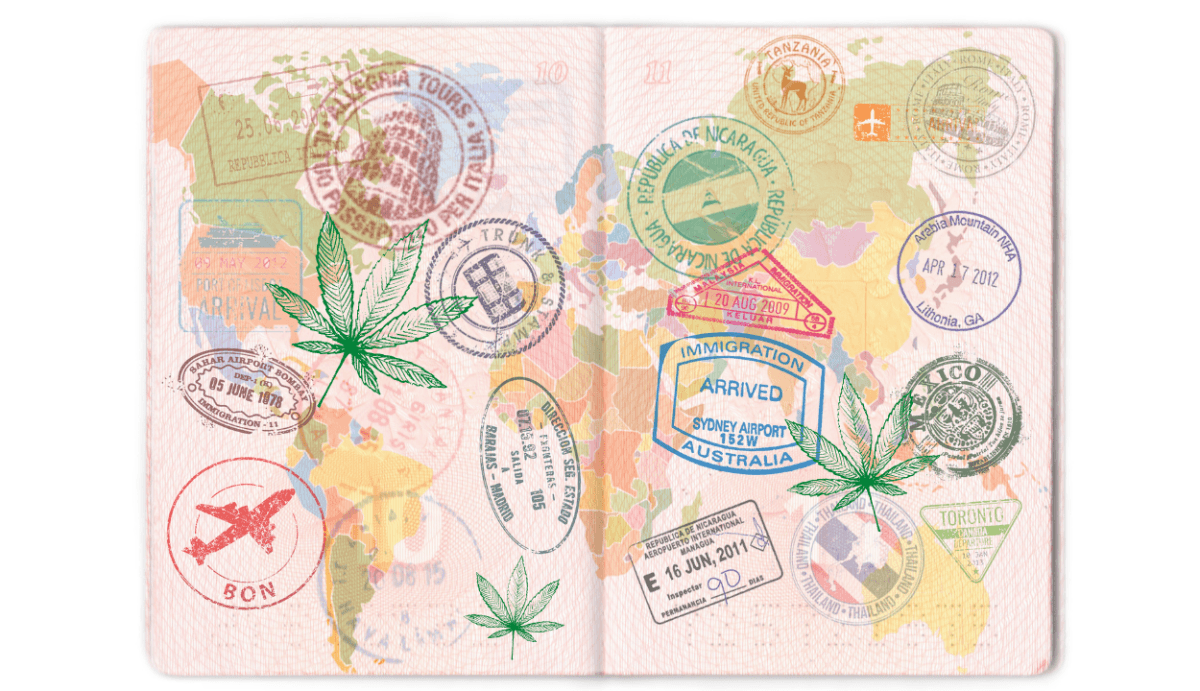Your Cart is Empty
FREE SHIPPING ON ALL ORDERS $75+
In the US, Delta-8-THC was legalized alongside the historic 2018 Farm Bill, which permanently removed hemp and its derivatives from the list of controlled substances. Delta-8 is a hemp derived cannabinoid and CBD isomer, both of which are covered under the federal definition for hemp and hemp products.
Some people describe the pathway by which Delta-8 is legal as a "legal loophole," while others point out that if the federal government had intended to make Delta-8 illegal, they would have done so by now. Either way, as it stands, Delta-8-THC is legal in the US, but hemp laws deviate from this stance across the globe.
If you're wondering "Is Delta-8-THC legal in other countries?" the answer is no, not usually. Still, there are some areas where Delta-8 may be legal through similar "loopholes." In other cases, the country's hemp laws are entirely unclear. Here's what we know for sure:
Table of Contents
Before we really dig into this list of places where Delta-8 is legal, we want to point out that the United States has some of the most advanced hemp laws in the world. In fact, the US may be the only area that defines hemp and marijuana as separate entities, so it is the only area where hemp-derived products may be legal while other cannabis products are not.
United States law makes several important differentiations that allow Delta-8-THC products only if they are produced according to certain standards, including that they must contain less than 0.3 % Delta-9-THC. In other areas where Delta-8-THC is legal, it's likely because cannabis as a whole is legal or otherwise unrestricted, and not because Delta-8-THC is considered a specialized product.
Alternatively, some countries have an outright ban on all cannabis products, including Delta-8 and other products made from hemp. For instance, Japan is known for having some of the strictest anti-cannabis laws in the world. Products that contain any amount of THC, including CBD with 0.3% Delta-9-THC or less, are subject to harsh penalties. In Japan, the possession of THC can result in jail time.
In some cases, Delta-8 and other cannabis products may not be explicitly legal, but are still treated as if they are legal due to loopholes that make the laws unenforceable.
For instance, in Amsterdam the sale and trade of cannabis is technically illegal, but the country considers the use of “soft drugs” a matter of personal health, which is not to be controlled by law. In other words, in Amsterdam it is legal to use cannabis even though the sale of cannabis is not regulated or approved by the government.
Similar laws can be observed in Spain where buying and selling cannabis is illegal, but personal use is unrestricted. Delta-8, while not explicitly legal, likely falls under the same loopholes in areas like this.
In the other areas where Delta-8 is legal, it is legal because cannabis as a whole is fully legal in that country. There are currently four countries that have fully legalized cannabis, including Canada, Uruguay, South Africa, and Georgia (the country). Mexico is also in the process of pushing new cannabis laws that would fully legalize cannabis consumption.
Because both cannabis and hemp are legal in these countries, many people assume that Delta-8 products are legal by default, but that’s not always the case. Some areas may consider isomers, analogues, and other compounds derived from cannabis to be illegal on the basis that they are not naturally derived from cannabis material.
We’ll explain:
Delta-8-THC is available in hemp material in very low concentrations which makes it difficult to extract it in large concentrations. To circumvent this, American manufacturers convert CBD extract into Delta-8 using a process called “isomerization.”
It’s not always easy to determine whether Delta-8 is legal in a country without doing some deep digging into their cannabis laws. The best approach is just to only consume products that you purchased in the area, since local vendors are much more likely to conform to local laws than products you carried overseas.

To put it briefly, it’s safer to assume that Delta-8 is illegal in any country that wasn’t mentioned above. This may not always be the case (particularly in the case that the country has no cannabis laws), but it’s generally true. Unfortunately, cannabis laws are overwhelmingly restrictive and most countries have a total ban on cannabis.
The exception is medical-use cannabis, which may be legal in far more areas. Still, Delta-8 is not commonly recognized as a medicinal substance so you’ll need to ensure that you double check the medical use laws (and carry your medical card) before assuming that Delta-8 is legal.
Delta-8 is not explicitly legal in any other country, and the US is the only country that explicitly legalizes hemp products as a whole. Still, some countries have no cannabis restrictions, which means Delta-8 may be legal by default (assuming they don't define cannabinoid isomers as a "synthetic substance"). Some countries simply don't address the legality of Delta-8 or other hemp products, but the majority have cannabis bans that also restrict Delta-8 and other hemp products.
In addition to a country's governing laws, you need to pay attention to local laws at the state or city level. If you intend to travel with Delta-8, the safest way to ensure that you are operating within the parameters of the law is to only consume products that were legally purchased in the area that you will consume them.
Although Delta-8 may not be legal in other countries, you can safely enjoy legal Delta-8-THC products in most US states. Just make sure that the products you buy are Farm Bill compliant and made with high-quality ingredients, like the products in our Elev8 Collection.

You may also want to read:
Comments will be approved before showing up.



